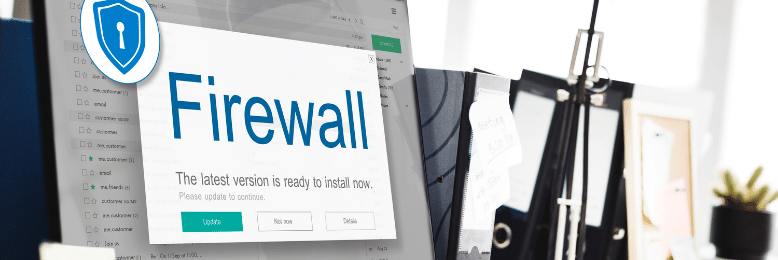3 Top Risks of Not Having a Firewall
October 12th, 2021 | 4 min. read

Not having a firewall for your business is a disaster waiting to happen. While it’s not perfect, skimping on a firewall can have dire consequences. Find out what a firewall does for your network, and the risks you might encounter if you don’t have one.
Editor's note: This post was originally published on December 13, 2020, and has been revised for clarity and comprehensiveness.
It's one of the most irresponsible things you can do on a computer -- accessing the internet without a firewall. It's your network's first line of defense. It's akin to driving your car on a freeway without a seatbelt.
While you might think it's not too bad. Perhaps you believe following healthy security practices is enough. But, you'll soon find that reality is far less forgiving.

According to a report by PurpleSec, cybercrime as a whole increased by 600% since the pandemic started. And out of all the reported cyberattacks in 2021, 43% were aimed at small organizations, 60% of which went out of business within six months of the attack.
The point is that the more people you have accessing your data over unsecured networks, the greater your risk for a security breach. You can't rely on good practices alone. In fact, in a study by Tessian, it was found that 88% of data breaches are a direct result of human error. That's where a firewall comes in.
A firewall should be your first priority when setting up your cybersecurity systems. It is your first line of defense and the first thing a cybercriminal will encounter when trying to breach your defenses. It helps you restrict access to sensitive information and helps you monitor your network for suspicious activity.
At ITS, we've helped hundreds of businesses bolster their cybersecurity efforts. From our experience, a good firewall is indispensable for network security.
In this article, we'll dive into what a firewall does, what types of firewalls there are, and the top three risks your business will face without one.
What does a firewall do?
In simple terms, your firewall is your network's gatekeeper. It establishes whether someone trying to access your network over the internet is trustworthy or not by using a predefined set of rules, like a digital doorman.
If a connection follows the rules, the firewall will let it through. However, if it breaks any of those rules, the firewall will block specific data packets from entering your IT network.
What are the two types of firewalls?
There are two main kinds of firewall that you can choose from, which are:
Hardware Firewall

Typically referred to as network firewalls, these physical devices are mounted between your computer and the web (or other network connection).
Many manufacturers and some Internet Service Providers (ISPs) sell integrated small office/home office routers with firewall capabilities as well.
For protecting multiple computers and controlling the network activity that attempts to pass through them, hardware-based firewalls are particularly useful.
Hardware-based firewalls have the advantage of offering an extra line of protection against attacks on desktop computer devices.
The downside is that they are distinct machines that need qualified experts to help with their configuration and maintenance.
Software Firewall

Most operating systems have a built-in firewall function that you can allow, even if you have an external firewall, for added security.
Software for firewalls is also available separately from your nearest computer shop, manufacturer of software, or ISP.
If you download firewall software from the internet, make sure that it comes from a reliable source (i.e., an existing distributor of software or a service and is offered via a secure website.)
The benefit of software firewalls is their ability to monitor individual applications' unique network activity on a device. A major downside, however, is that it is normally located on the same device that is being secured. Being located on the same computer will impair the ability of the firewall to detect and avoid malicious activity.
Another potential drawback to software firewalls is that you would need to manually upgrade and control the firewall of each device if you have a firewall for each computer on a network.
What are the top three risks of not having a firewall?
While having a firewall won't ensure that your business will be safe from all manner of attacks, the consequences of not having one are exponentially worse. Take a look below at the top three risks of not having a firewall:
1. Unlimited Public Access

Not having a firewall is practically the same as leaving your front door wide open. It's like you're inviting criminals to hack into your network -- and they will. A business without a firewall is easy pickings, as it means everyone can gain access to their network, and they will have no way of monitoring potential threats and untrustworthy traffic.
2. Unrestricted Data Access

If anyone can waltz into your IT network, they are free to access all of your data.
Now, if you think that your small business doesn't have to worry because the data you generate doesn't have value outside your organization, you should seriously reconsider. Your data is valuable, and cybercriminals know it. Ponemon Institute reported that the average cost of a data breach is $4.24 million per incident, 10% higher than last year's $3.85 million.
Without a firewall, you are giving attackers free rein of your information. With that, they can choose to steal your data, leak it to the public, encrypt it and hold it for ransom, or simply delete it. Failing to protect your network with a firewall isn't just a mistake that can cost you a lot of money; it can cost you your business.
3. Network Downtime
.png?width=778&name=Smaller%20Blog%20Template%20(2).png)
One of the worst possible scenarios you can encounter without a firewall is total network collapse. Without adequate protection, malicious criminals can effectively shut your business down. And that can result in catastrophic damage to your business. Not only can you lose data, but it might also take days or even weeks before your systems can be brought back up and running.
According to a study conducted by Vanson Bourne of GE Digital, on average, unplanned downtime can cost a company more than $250,000/hour. Some industries even reported an average cost of more than $25,000/minute. When you add in the impact of lost productivity, morale, and customer trust, then it's only a matter of time before the damage of downtime becomes irreversible.
Ready to protect your network with a firewall? Avoid the risks of not having a firewall

A firewall is one of the most basic aspects of cybersecurity. While it isn't impenetrable, when combined with other security solutions, it can be highly effective in protecting your network. There's a reason security experts have been implementing them for over 25 years.
At ITS, we've helped hundreds of businesses secure their networks, and we would always recommend setting up a firewall.
Want to set up a firewall for your business? Find out how to choose the right firewall for your business.
Mark Sheldon Villanueva has over a decade of experience creating engaging content for companies based in Asia, Australia and North America. He has produced all manner of creative content for small local businesses and large multinational corporations that span a wide variety of industries. Mark also used to work as a content team leader for an award-winning digital marketing agency based in Singapore.
Topics:
